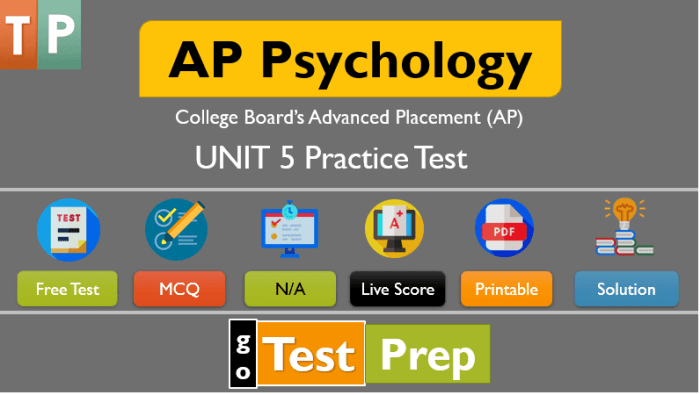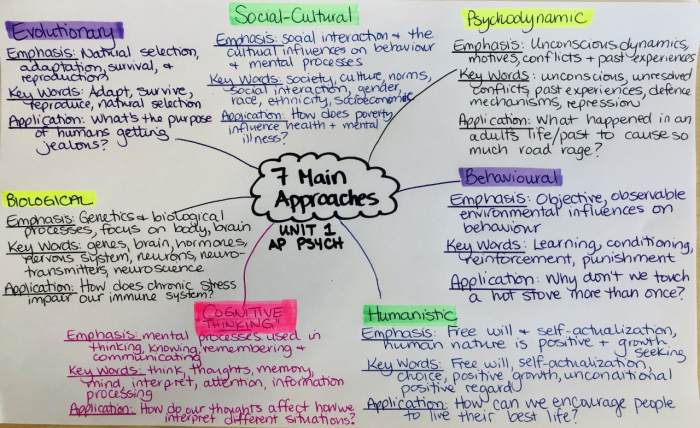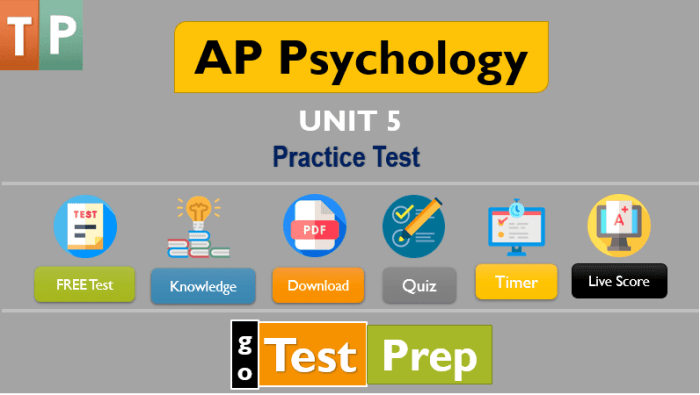Ap psychology unit 6 developmental psychology practice test – Prepare for success in AP Psychology with our comprehensive practice test for Unit 6: Developmental Psychology. Dive into the fascinating stages of cognitive, social, emotional, moral, language, and physical development, gaining a deeper understanding of the complexities of human growth.
This practice test will challenge your knowledge, assess your understanding, and provide valuable insights into the theories and concepts that shape our understanding of developmental psychology.
Cognitive Development

Cognitive development refers to the changes in thinking, problem-solving, and memory that occur throughout childhood. Jean Piaget, a Swiss psychologist, proposed a stage theory of cognitive development, which suggests that children’s thinking progresses through a series of distinct stages as they mature.
Piaget’s Stages of Cognitive Development
- Sensorimotor stage (birth to 2 years):Infants learn about the world through their senses and motor skills.
- Preoperational stage (2 to 7 years):Children develop language and imagination, but their thinking is still egocentric and intuitive.
- Concrete operational stage (7 to 11 years):Children become more logical and can solve concrete problems, but they still struggle with abstract concepts.
- Formal operational stage (11 years and up):Adolescents develop the ability to think abstractly and reason hypothetically.
Role of Culture and Experience in Cognitive Development
Culture and experience play a significant role in cognitive development. Children who grow up in different cultures may have different ways of thinking about the world. For example, children from collectivist cultures may be more likely to think in terms of the group, while children from individualistic cultures may be more likely to think in terms of the individual.
Social and Emotional Development: Ap Psychology Unit 6 Developmental Psychology Practice Test

Social and emotional development refers to the changes in social behavior, emotional regulation, and self-concept that occur throughout childhood. Erik Erikson, a German-American psychologist, proposed a stage theory of psychosocial development, which suggests that children’s social and emotional development progresses through a series of distinct stages as they mature.
Erikson’s Stages of Psychosocial Development
- Trust vs. mistrust (birth to 1 year):Infants develop a sense of trust or mistrust based on their interactions with their caregivers.
- Autonomy vs. shame and doubt (1 to 3 years):Toddlers develop a sense of autonomy or shame and doubt as they learn to control their own behavior.
- Initiative vs. guilt (3 to 6 years):Preschoolers develop a sense of initiative or guilt as they learn to take on new challenges.
- Industry vs. inferiority (6 to 11 years):School-aged children develop a sense of industry or inferiority as they learn to compare themselves to others.
- Identity vs. role confusion (12 to 18 years):Adolescents develop a sense of identity or role confusion as they explore different roles and identities.
Impact of Family, Peers, and Culture on Social and Emotional Development
Family, peers, and culture all play a significant role in social and emotional development. Children who grow up in supportive families and have positive peer relationships are more likely to develop healthy social and emotional skills. Culture also influences social and emotional development, as children from different cultures may have different ways of expressing and regulating their emotions.
Moral Development

Moral development refers to the changes in moral reasoning and behavior that occur throughout childhood. Lawrence Kohlberg, an American psychologist, proposed a stage theory of moral development, which suggests that children’s moral reasoning progresses through a series of distinct stages as they mature.
Kohlberg’s Stages of Moral Development
- Pre-conventional stage (birth to 9 years):Children make moral decisions based on external rewards and punishments.
- Conventional stage (9 to 13 years):Children make moral decisions based on social norms and expectations.
- Post-conventional stage (13 years and up):Adolescents and adults make moral decisions based on abstract principles of justice and fairness.
Role of Parents, Teachers, and Peers in Moral Development
Parents, teachers, and peers all play a significant role in moral development. Parents who provide their children with clear moral guidance and support help them to develop a strong moral foundation. Teachers who create a positive and supportive learning environment can also help children to develop their moral reasoning skills.
Peers can also influence moral development, as children who have friends who behave ethically are more likely to behave ethically themselves.
Language Development

Language development refers to the changes in language comprehension and production that occur throughout childhood. Language development is a complex process that involves many different skills, including listening, speaking, reading, and writing.
Stages of Language Development, Ap psychology unit 6 developmental psychology practice test
- Prelinguistic stage (birth to 1 year):Infants communicate through crying, cooing, and babbling.
- One-word stage (1 to 2 years):Toddlers begin to use single words to communicate.
- Two-word stage (2 to 3 years):Preschoolers begin to combine words to form simple sentences.
- Telegraphic speech stage (3 to 4 years):Preschoolers begin to use more complex sentences, but they still omit some grammatical elements.
- Complete speech stage (4 years and up):School-aged children begin to use more complex sentences and their grammar becomes more sophisticated.
Role of Input and Interaction in Language Development
Input and interaction play a critical role in language development. Children who are exposed to a lot of language input, such as talking, reading, and singing, are more likely to develop strong language skills. Children who have opportunities to interact with others, such as talking to their parents, siblings, and friends, are also more likely to develop strong language skills.
Impact of Bilingualism on Language Development
Bilingualism, or the ability to speak two languages, can have a positive impact on language development. Bilingual children are often more proficient in both languages than monolingual children. They are also more likely to be able to think critically and solve problems.
Physical Development
Physical development refers to the changes in body size, shape, and composition that occur throughout childhood. Physical development is influenced by a number of factors, including genetics, nutrition, exercise, and sleep.
Major Physical Changes that Occur During Childhood
- Infancy:Infants grow rapidly and their body proportions change significantly.
- Toddlerhood:Toddlers continue to grow, but at a slower rate. They also begin to develop motor skills, such as walking and running.
- Preschool:Preschoolers continue to grow and develop motor skills. They also begin to lose their baby teeth.
- School age:School-aged children continue to grow and develop motor skills. They also begin to experience puberty.
- Adolescence:Adolescents experience a growth spurt and their body proportions change significantly. They also reach sexual maturity.
Role of Nutrition, Exercise, and Sleep in Physical Development
Nutrition, exercise, and sleep all play a critical role in physical development. Children who eat a healthy diet, get regular exercise, and get enough sleep are more likely to be healthy and fit. Children who do not get enough nutrition, exercise, or sleep are more likely to be overweight or obese and have other health problems.
Impact of Chronic Illness or Disability on Physical Development
Chronic illness or disability can have a significant impact on physical development. Children with chronic illnesses or disabilities may not be able to participate in physical activities or may have other health problems that affect their growth and development. It is important for children with chronic illnesses or disabilities to receive appropriate medical care and support to help them reach their full potential.
FAQ Compilation
What is the purpose of this practice test?
To assess your understanding of the key concepts and theories in developmental psychology and prepare you for the AP Psychology exam.
What topics are covered in this practice test?
Cognitive development, social and emotional development, moral development, language development, and physical development.
How can I use this practice test effectively?
Take the test under timed conditions, review your answers, identify areas for improvement, and seek clarification from your teacher or a study group.